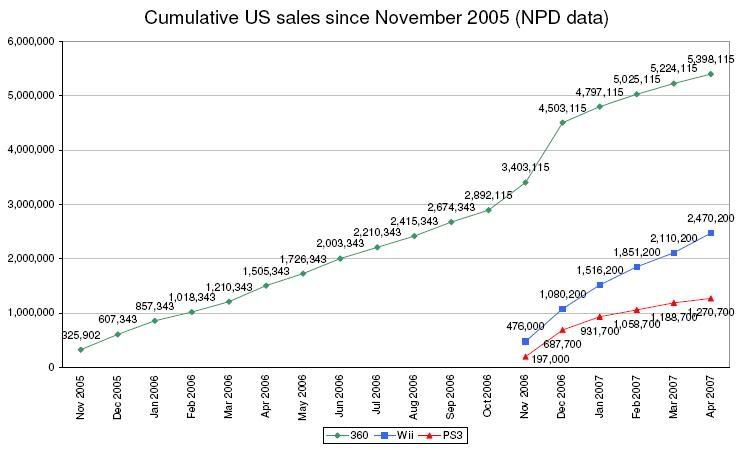i just don't see any evidence in the good ol' u s of a that software releases on a home console produce noticeable increases in sales of a home console over and above existing trends.
go ahead, look at sales of ps2, xbox, and gamecube. point me to any increase in sales outside of seasonal trends that is not tied to a price drop or, in the case of the ps2 during the slimline changeover, the end of shortages. i can't find one. all of the upticks are during the holidays and they have a near uniform correlation to sales during the non-holiday months. software sells systems, but the effect of software is not felt all at once; it is felt before, during, and after the game's release as something that affects the console's momentum, it doesn't seem to greatly impact sales numbers the actual month the game is released. but i'd be interested to see someone else's take on it.
but for this, and strictly because i'm more aware of these two systems' release schedules, let's look at a few non-holiday major software releases for xbox and gamecube.
august 2002. super mario sunshine released towards the end of the month. august npd for gamecube -> down from july. september npd (five week reporting period, adjusted) -> up 4% from august. september also saw the release of star fox adventures, which i believe pulled very good numbers. the internet may hate it, but it reviewed and sold really well.
march 2003. legend of zelda: the wind waker released towards the end of the month. march npd for gamecube -> numerically flat versus february, but march was a 5 week reporting period, so it was actually down considerably in the weeklies. april npd was down even more.
july 2003. star wars knights of the old republic released on xbox. it set records for initial sales on xbox at the time of its release, went on to sell more than a million copies all told. july npd -> up 3% versus june (adjusted from 5 weeks to 4 weeks).
march 2004. ninja gaiden released on xbox. sold several hundred thousand units in its first month. march npd (five week reporting period) -> numerically nearly flat to february, weekly sales down more than 20%.
september 2004. fable released on xbox. has sold well over a million copies, hundreds of thousands the first month. september npd -> weekly average down 2% versus august.
the reason i listed non-holiday releases is that you can see if there is any tangible selling power of these games over and beyond established patterns more easily than you can for holiday releases, where consoles sell in massive quantities due to moms and dads and grandmas and everybody else buying game consoles for their loved ones.
it might work differently on portables, and it might work differently in japan, but games don't immediately sell home systems in the united states. look at xbox 360 last year. every month, there was a contingent of people saying "this is when the thing takes off." 360 supporters would look forward to npd for hope. 360, um, non-supporters would look forward to npd with comments such as "if it doesn't sell well this month, d00m." oblivion, graw, dead rising, madden!, saint's row, all of them came and all of them went. flat sales. gears of war launched during the holiday. stuff sells during the holiday. how's 360 doing in early 2007, riding the wave of success surely caused by the monstrous gears? eh, sales are starting to sag off established non-holiday 50k/week patterns.
bubububut halo 3 is real big. grand theft auto iv is real big. established patterns are bigger. and $400 is pretty dern big, too.
oh, guess what i think lesser titles like metal gear solid 4 will do for a $600 or even $500 ps3?
the only thing that will spur sales of these systems over and beyond what they're doing now are price reductions.
again, that's my opinion, feel free to offer another take.



